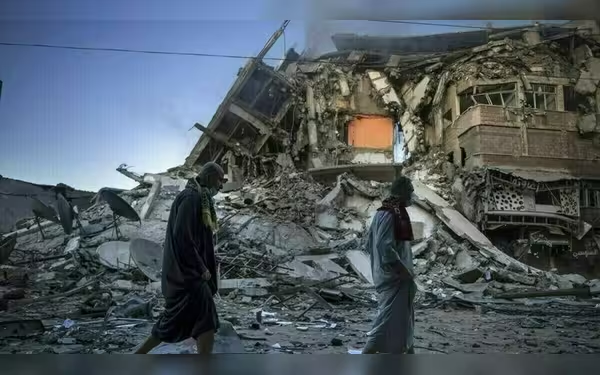Saturday, November 16, 2024 06:49 PM
Escalating Violence in Gaza: A Call for Global Accountability
- Over 41,870 Palestinians killed since 1967 occupation.
- International bodies condemn Israel's actions as humanitarian catastrophe.
- Calls for ceasefire grow amid escalating regional tensions.
 Image Credits: brecorder
Image Credits: brecorderThe ongoing Gaza conflict escalates, prompting global calls for accountability and humanitarian intervention amid rising casualties.
As the world watches, the ongoing conflict between Israel and Gaza has escalated into what many are calling a "genocidal war." This situation took a dramatic turn on October 7, 2023, when the Al-Qassem Brigade, the military wing of Hamas, launched an incursion into southern Israel. This event resulted in the tragic loss of approximately 1,140 lives and left around 240 individuals taken hostage. However, it is crucial to understand that this violence is rooted in a long history of conflict, with Israel continuing to occupy Palestinian lands since the 1967 war. For nearly 17 years, Gaza has been under a severe blockade, leading to dire humanitarian conditions.
By the time of the October 7 incident, reports indicated that Israel had already killed over 41,870 Palestinians, which translates to one out of every 55 residents of Gaza. Additionally, at least 97,303 individuals were reported injured, with countless others trapped beneath the rubble of destroyed buildings, hospitals, and UN facilities. The United Nations has highlighted that more children in Gaza were killed in recent months than in four years of global conflict, underscoring the severity of the situation.
International bodies, including rights organizations, the UN General Assembly, and the International Court of Justice, have condemned Israel for its actions, labeling them as a humanitarian catastrophe. Despite these calls for accountability, Israel has expanded its military operations beyond Gaza, launching attacks in Lebanon, Syria, and Yemen, all while receiving unwavering support from the United States and its European allies. This support is particularly troubling given that these nations often preach about human rights.
President Joe Biden and other American leaders frequently justify Israel's actions by claiming it has the "right to self-defense." However, this narrative conveniently overlooks the fact that Israel is occupying Palestinian territory, which is a clear violation of international law and numerous UN resolutions. Historically, American presidents like Ronald Reagan were not hesitant to use their influence to hold Israel accountable. For instance, after Israel bombed Iraq's nuclear reactor in 1981, Reagan's administration supported a UN resolution condemning the attack and even suspended the delivery of F-16 fighter jets to Israel.
In recent years, however, the dynamics have shifted dramatically. The influence of the pro-Israel lobby in the United States has grown so powerful that American leaders often hesitate to challenge Israel's actions. A striking example of this was when Israeli Prime Minister Benjamin Netanyahu received a standing ovation from Congress during his visit to the U.S. last month, despite the ongoing violence in Gaza.
As the situation continues to deteriorate, Israel is reportedly preparing to launch an attack on Iran, following missile strikes from Iran in retaliation for the killing of Hamas leader Ismail Haniyeh and Hezbollah's Hassan Nasrallah. Instead of advocating for peace, President Biden has only urged Israel to spare oil facilities, reflecting a self-serving interest. Former President Donald Trump has even suggested targeting Iran's nuclear sites, which could potentially ignite a broader conflict in the Middle East.
The relentless cycle of violence in Gaza and the broader region raises critical questions about the future of peace and stability. As citizens around the world call for a ceasefire and an end to the suffering, it is essential for global leaders to prioritize humanitarian concerns over political interests. The ongoing conflict serves as a stark reminder of the urgent need for dialogue, understanding, and a commitment to justice for all parties involved. Only through genuine efforts towards reconciliation can we hope to see an end to the relentless crimes against humanity that have plagued this region for far too long.













